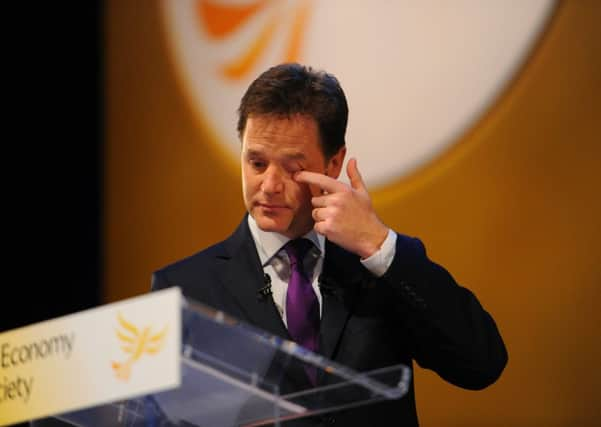Sam Ghibaldan: Clegg needs to be assertive


Worried, exhausted and slightly haunted, pictures of a red-eyed Nick Clegg which emerged earlier this week were testament to the impact of his party’s losses in the European and local elections.
It may be scant comfort to Clegg now, but at some stage most political leaders find themselves atop an electorally battered party, suffering demands for their resignation.
Advertisement
Hide AdAdvertisement
Hide AdBut few party leaders experience reverses as great as Clegg’s last week. The Liberal Democrats lost 90 per cent of their MEPs; that the party’s vote declined by just 50 per cent can hardly be taken as reassurance. Neither can the electorate’s rejection be explained away as the usual mid-term warning to a party of government.
In his parting flounce, the would-be leadership conspirator Lord Oakeshott blamed Clegg and the Coalition for the Liberal Democrats’ misfortunes, claiming they’d become the “split-the-difference centre party”.
Does the Coalition really explain the problem though? It’s worth remembering that for much of the first Scottish Parliament, Jim Wallace, the Liberal Democrat deputy first minister, was attacked from within his party for entering coalition with Labour.
As some now fear that coalition with the Tories will cost seats that have a strong Labour vote, Wallace’s critics feared that the Labour pact would have a similar impact in constituencies with strong Tory support. In hindsight those concerns for Scottish Parliament seats were mistaken; the party held them at the next election.
The relationship between the public and a politician isn’t that different to any other relationship. Policy is not as important as instinct, emotion or expectations. This is evident in the coalition experiences of Wallace and Clegg.
When the new Scottish Parliament was elected in 1999, public hopes centred on the institution rather than any individual leader. Indeed, expectations of Wallace were low; he was subjected to a relentless critical barrage from day one, accused of selling out for a “ministerial Mondeo”. It took time for Wallace’s reputation to grow.
The contrast to Clegg in 2010 is striking. Then, Westminster politics was tired and jaded. There was discontent with Gordon Brown, but no enthusiasm for David Cameron. Onto the election stage came Clegg, wearing Charles Kennedy’s anti-politics mantle. He channelled the public’s hope for a new style of politics. His bravura performances in the leaders’ debates prompted the media to coin a new term; Cleggmania.
But if the electorate’s connection with Clegg was emotional, so was their reaction to his abandonment of the abolition of tuition fees, his party’s primary election pledge. Once the saviour, he suddenly appeared just another politician. Regardless of the merits of the policy, in political terms the tuition fees debacle was a serious strategic error. As Tony Blair found to his cost over Iraq, it is a hard road to reclaim the trust of your electorate after disappointing them so badly.
Advertisement
Hide AdAdvertisement
Hide AdSo is there a way out for Clegg? Lib Dem party members are worried but, despite the efforts of Lord Oakeshott, the striking thing is how few of them have sought his resignation. Most believe Clegg is a decent man trying to make the best of difficult circumstances. UK government policies may grate upon them, but in the main they understand why Clegg entered coalition. After decades of advocating it as a form of government, how could they not?
More pragmatic members are likely to have assessed the alternatives. A change of leader isn’t likely to make much difference by the time of next year’s general election. The electorate’s recognition of individual politicians is generally surprisingly low; a new leader would need time to make an impact.
What’s more, any new leader would immediately face a Catch-22 decision. Stay in the Coalition and inherit Clegg’s baggage; or leave, breaking the party’s oft-repeated promise to remain in government until the election.
In that light, Clegg’s decision that staying is in the best interests of the party makes sense. It is honourable; this can’t be fun for him. He’d only be human if sometimes he wished he could walk away. What next, then? Well, strained relationships aren’t repaired overnight. Contrition will be required, punishment may be meted out, fresh understandings must be reached.
To borrow from a well-known phrase, rebuilding a relationship is a process, not an event. Clegg and his Westminster party have acknowledged their mistakes. Last week, they took the electorate’s punishment firmly on the chin. Though there may be more to come, they must hope that with time voters will accept their sincerity.
The path of reconciliation requires the Liberal Democrats to enthuse voters with a liberal vision of the UK and its place in the world. Polls suggest most voters want to stay part of Europe. “The party of in” was a strong message in the Euro campaign that may resonate more widely with time. But more is needed: to rebuild trust, the party must connect to voters’ own aspirations. That does not require them to reinvent their core beliefs; instead, they must assert them, rather than pander to the Ukip threat as other parties seem inclined to do.
The party too, needs grounds for hope to be motivated. Strangely perhaps, the recent elections have provided that. In Liberal Democrat-held Westminster seats, strong campaigns helped protect the party’s vote share in the most trying of circumstances. For Clegg, and his party, the lesson must be to keep on keeping on.